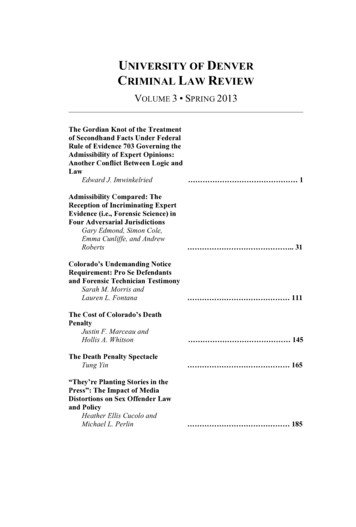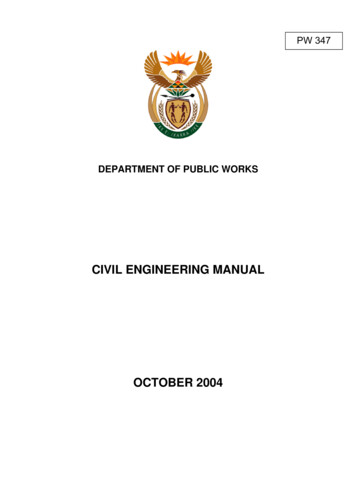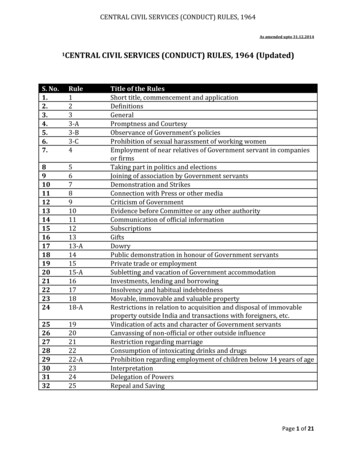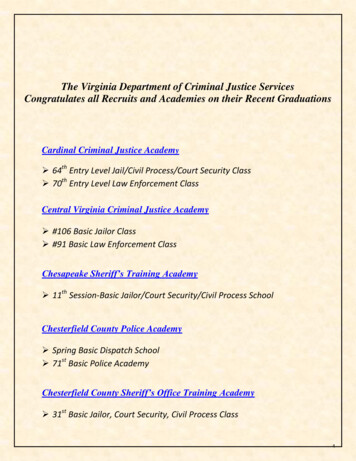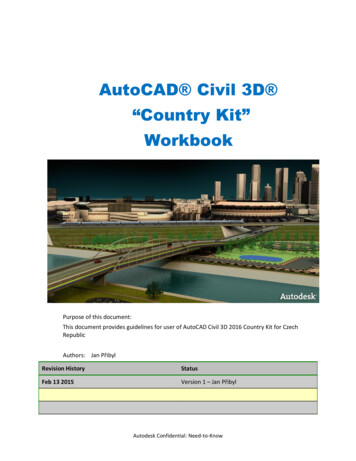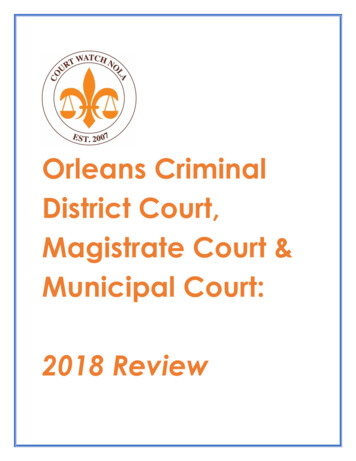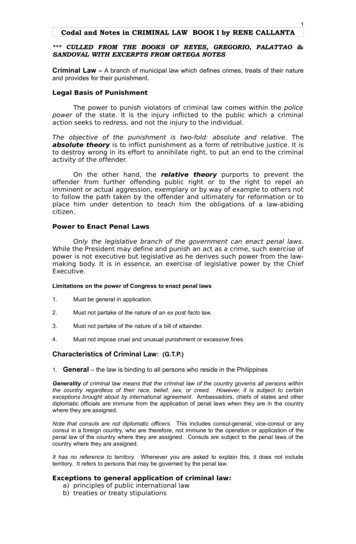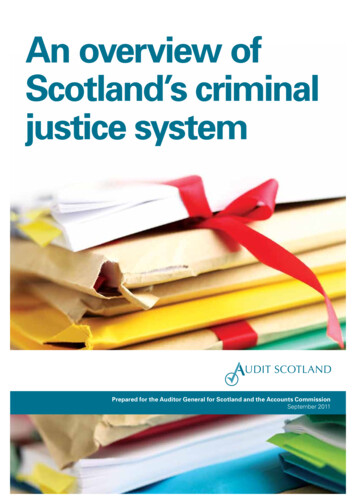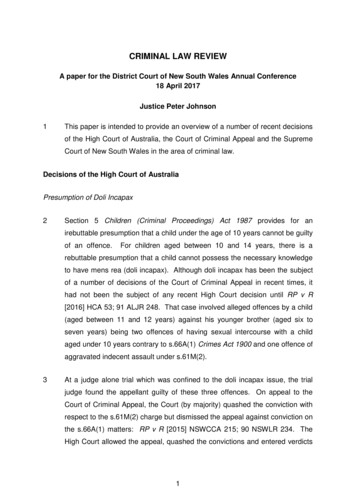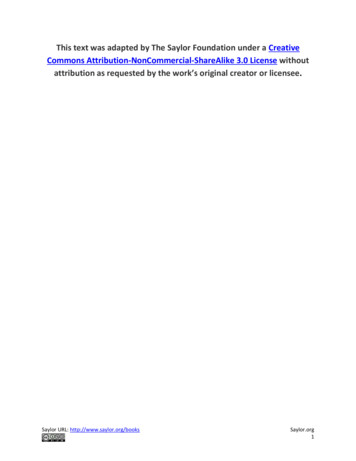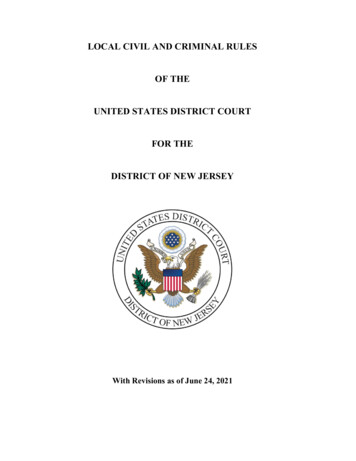
Transcription
LOCAL CIVIL AND CRIMINAL RULESOF THEUNITED STATES DISTRICT COURTFOR THEDISTRICT OF NEW JERSEYWith Revisions as of June 24, 2021
TABLE OF CONTENTSINTRODUCTION - 1984 RevisionFOREWORD - 1997 RevisionTable of ContentsCiv. RULE 1.1 RULES OF PROCEDURE; SCOPE OF THESE RULES . 1Civ. RULE 1.2 DEFINITIONS . 1Civ. RULE 4.1 SERVICE OF PROCESS. 2Civ. RULE 5.1 SERVICE AND FILING OF PLEADINGS AND OTHER PAPERS . 2Civ. RULE 5.2 ELECTRONIC SERVICE AND FILING DOCUMENTS . 2Civ. RULE 5.3 CONFIDENTIALITY ORDERS AND RESTRICTING PUBLIC ACCESSUNDER CM/ECF . 10Civ. RULE 6.1 EXTENSIONS OF TIME AND CONTINUANCES . 16Civ. RULE 7.1 APPLICATION AND MOTION PRACTICE . 16Civ. RULE 7.1.1 DISCLOSURE OF THIRD-PARTY LITIGATION FUNDING . 19Civ. RULE 7.2 AFFIDAVITS AND BRIEFS . 19Civ. RULE 8.1 PLEADING DAMAGES . 20Civ. RULE 9.1 SPECIAL MATTERS - REVIEW OF SOCIAL SECURITY MATTERS . 20Civ. RULE 9.2 SPECIAL MATTERS - ADMIRALTY AND MARITIME RULES FOR THEUNITED STATES DISTRICT COURT FOR THE DISTRICT OF NEW JERSEY . 23L. Civ. R. 9.3 SPECIAL MATTERS - LOCAL PATENT RULES FOR THE UNITED STATESDISTRICT COURT FOR THE DISTRICT OF NEW JERSEY . 28Civ. RULE 10.1 FORM OF PLEADINGS . 41Civ. RULE 11.1 SIGNING OF PLEADINGS . 41Civ. RULE 11.2 - VERIFICATION OF PETITIONS AND INITIAL CERTIFICATIONS . 41Civ. RULE 11.3 APPLICATIONS FOR FED. R. CIV. P. 11 SANCTIONS . 42Civ. RULE 12.1 DEFENSES AND OBJECTIONS: WHEN AND HOW PRESENTED . 42Civ. RULE 12.2 MOTION TO DISMISS FEWER THAN ALL CLAIMS . 42Civ. RULE 15.1 MOTIONS TO FILE AMENDED PLEADINGS . 42Civ. RULE 16.1 PRETRIAL CONFERENCES; SCHEDULING; CASE MANAGEMENT . 42Civ. RULE 24.1 NOTICE OF CLAIM OF UNCONSTITUTIONALITY . 45Civ. RULE 24.2 STATUTORY COURT . 45Civ. RULE 26.1 DISCOVERY . 45
Civ. RULE 27.1 DEPOSITIONS FOR USE IN A FOREIGN COUNTRY . 47Civ. RULE 28.1 LETTERS ROGATORY . 48Civ. RULE 33.1 INTERROGATORIES. 48Civ. RULE 34.1 REQUESTS FOR PRODUCTION OF DOCUMENTS . 48Civ. RULE 36.1 REQUESTS FOR ADMISSION. 48Civ. RULE 37.1 DISCOVERY MOTIONS . 49Civ. RULE 37.2 APPLICATIONS FOR FED. R. CIV. P. 37 SANCTIONS . 49Civ. RULE 38.1 JURY DEMAND . 49Civ. RULE 40.1 ALLOCATION AND ASSIGNMENT OF CASES . 50Civ. RULE 41.1 DISMISSAL OF INACTIVE CASES . 51Civ. RULE 42.1 CONSOLIDATION OF CASES. 51Civ. RULE 44.1 SEAL . 51Civ. RULE 47.1 PETIT JURORS . 51Civ. RULE 47.2 ASSESSMENT OF JURY COSTS. 52Civ. RULE 48.1 CIVIL JURY . 52Civ. RULE 48.2 TAKING OF CIVIL VERDICT . 52Civ. RULE 52.1 ORAL OPINIONS . 52Civ. RULE 54.1 COSTS . 52Civ. RULE 54.2 COMPENSATION FOR SERVICES RENDERED AND REIMBURSEMENTOF EXPENSES . 54Civ. RULE 54.3 PREPAYMENT OF CLERK'S AND MARSHAL'S FEES . 55Civ. RULE 56.1 SUMMARY JUDGMENT MOTIONS . 55Civ. RULE 58.1 ENTRY OF JUDGMENTS AND ORDERS. 56Civ. RULE 65.1 APPLICATIONS FOR EMERGENCY RELIEF. 56Civ. RULE 65.1.1 SECURITY AND SURETIES . 56Civ. RULE 66.1 RECEIVERSHIPS . 57Civ. RULE 67.1 DEPOSIT IN COURT AND DISBURSEMENT OF COURT FUNDS . 58Civ. RULE 69.1 MARSHAL'S VOUCHERS . 60Civ. RULE 72.1 UNITED STATES MAGISTRATE JUDGES . 60Civ. RULE 73.1 CIVIL TRIALS BY CONSENT BEFORE UNITED STATES MAGISTRATEJUDGES. 63Civ. RULE 77.1 COURT SESSION . 64Civ. RULE 78.1 MOTION DAYS AND ORAL ARGUMENT. 64
Civ. RULE 79.1 CUSTODY OF ORIGINAL PAPERS, RECORDS AND EXHIBITS . 64Civ. RULE 79.2 BRIEFS PART OF PUBLIC RECORD . 65Civ. RULE 79.3 ENTRY OF SATISFACTION OF JUDGMENTS AND DECREES . 65Civ. RULE 79.4 FILING OF MANDATE . 65Civ. RULE 79.5 CLERK TO MAINTAIN LIST OF OFFICIAL NEWSPAPERS . 65Civ. RULE 80.1 TRANSCRIPTS . 65Civ. RULE 81.1 NATURALIZATION . 66Civ. RULE 81.2 PETITIONS FOR HABEAS CORPUS AND MOTIONS UNDER 28 U.S.C. §2255 IN NON-DEATH PENALTY CASES . 66Civ. RULE 81.3 PETITIONS FOR HABEAS CORPUS AND MOTIONS UNDER 28 U.S.C. §2255 IN DEATH PENALTY CASES . 66Civ. RULE 83.1 ADOPTION AND AMENDMENT OF LOCAL RULES . 69Civ. RULE 83.2 RELAXATION OR MODIFICATION OF LOCAL RULES . 69Civ. RULE 83.3 PROCEDURE IN THE ABSENCE OF RULE OR STATUTORY PROVISION. 69Civ. RULE 85.1 TITLE . 69Civ. RULE 101.1 ADMISSION OF ATTORNEYS . 70Civ. RULE 102.1 WITHDRAWAL OF APPEARANCE . 74Civ. RULE 103.1 JUDICIAL ETHICS AND PROFESSIONAL RESPONSIBILITY . 74Civ. RULE 104.1 DISCIPLINE OF ATTORNEYS . 74Civ. RULE 105.1 EXTRAJUDICIAL STATEMENTS . 83Civ. RULE 201.1 ARBITRATION . 84Civ. RULE 301.1 MEDIATION . 89Civ. RULE 401.1 RESTRICTIONS OF ALL BROADCASTING, PHOTOGRAPHING, VIDEOOR VOICE RECORDING . 91CIV. RULE 501.1 POSSESSION AND USE OF ELECTRONIC EQUIPMENT . 92Cr. Rule 1.1 SCOPE AND APPLICABILITY . 95Cr. RULE 5.1 UNITED STATES MAGISTRATE JUDGES . 96Cr. RULE 7.1 GRAND JURORS . 97Cr. RULE 12.1 MOTIONS UNDER FED. R. CRIM. P. 12 . 97Cr. RULE 18.1 ASSIGNMENT OF CRIMINAL CASES . 97Cr. RULE 24.1 SELECTION AND IMPANELMENT OF TRIAL JURORS . 97Cr. RULE 32.1 PROBATION . 98Cr. RULE 41.1 MOTIONS UNDER FED. R. CRIM. P. 41 . 98
Cr. RULE 44.1 FORMAL WRITTEN APPEARANCE - CRIMINAL MATTERS . 98Cr. RULE 46.1 RELEASE FROM CUSTODY . 99Cr. RULE 53.1 CONDUCT IN THE COURTROOM . 101Cr. RULE 55.1 RECORD OF PROCEEDINGS. 101Cr. RULE 55.2 CUSTODY AND DISPOSITION OF EXHIBITS. 102Cr. RULE 58.1 PROCEEDINGS IN MISDEMEANOR AND PETTY OFFENSE CASES. 102Cr. RULE 60.1 TITLE . 103Cr. RULE 101.1 EXTRAJUDICIAL STATEMENTS IN CRIMINAL PROCEEDINGS . 103
COURT'S Q.R.S.T.U.Client's & Supervising Attorney's Authorizations for Appearance by Law StudentForm for Designating Compliance with the Student Practice RuleCriminal Case Appearance FormAffidavit by Owner of Cash SecurityOrder Granting Motion to Deposit Sum of Money with the Court into the Court RegistryInvestment System Liquidity FundOrder Granting Motion to Deposit Sum of Money with the Court into the Court RegistryInvestment Disputed Ownership FundList of Petty Offenses and Minimum Fines Applicable Thereto Pursuant to L.Cr.R. 58.1(c)Transcript RatesOfficial NewspapersAppointment of Attorneys in Pro Se Civil ActionsPlan for the Composition, Administration and Management of the Panel of Private AttorneysUnder the Criminal Justice ActPlan for Prompt Disposition of Criminal CasesSchedule of FeesApplication for Extension of Time to ReplyGuidelines for ArbitrationRESERVEDOptional RICO Case OrderIn Forma Pauperis Affidavit and OrderGuidelines for MediationGuidelines for Litigation ConductDiscovery Confidentiality OrderRESERVEDForm of Index
INTRODUCTION - 1984 RevisionThe General Rules of the United States District Court for the District of New Jersey have undergone acomplete revision for the first time in many years. The catalyst for this project was a request in the autumn of1983 from then Chief Judge Collins J. Seitz of the Court of Appeals for the Third Circuit, who requested thatwe assess our local rules to determine whether there was strict compliance with the Federal Rules of Civil,Criminal and Appellate Procedure. To that end, the Court asked the United States District Court LawyersAdvisory Committee to undertake the evaluation and, in addition, advise the Court as to those rules which theCommittee felt could be revised in order to simplify practice before the United States District Court as well ascomply with the spirit of Rule 1 of the Federal Rules of Civil Procedure requiring that "rules shall be construedto secure the just, speedy, and inexpensive determination of every action."A committee of Court officials was appointed to work with the Lawyers Advisory Committee. The fullCommittee was composed of the following:Donald A. Robinson, Esquire, ChairmanJonathan L. Goldstein, EsquireJoseph H. Kenney, EsquireJoseph H. Markowitz, EsquireWilliam J. O’Shaughnessy, EsquireHonorable John F. Gerry, U.S.D.J.Honorable Dickinson R. Debevoise, U.S.D.J.Honorable John W. Bissell, U.S.D.J.Honorable Jerome B. Simandle, U.S.M.J.Allyn Z. Lite, Esquire, Clerk of the CourtThe Committee notified the bar of its project and sought comments as to which rules the bar wished tosee modified and what changes should be made. The Committee considered the responses from the bar andpresented to the Court a proposed new rule book. The Conference of Judges of the United States District Courttentatively adopted the rules pending their initial publication and further comment from the bar. Unless suchcomment creates the need for further major revision, it is expected that the new rules will be effective onOctober 1, 1984.The Court wishes to extend its appreciation to the members of the Lawyer's Advisory Committee fortheir exceptional efforts in bringing this project to completion. An undertaking of this magnitude simply wouldnot have been possible without the experience, concern, sensitivity and professionalism of the members of theCommittee. The entire bar is in their debt.CLARKSON S. FISHERChief JudgeFor the CourtNewark, New JerseyOctober 1, 1984
FOREWORD - 1997 RevisionPursuant to Congressional mandate (P.L. 103-317), this Court, during the past six months, has dividedits General Rules into Local Civil Rules and Local Criminal Rules, renumbered to correspond to theircounterparts in the Federal Rules of Civil and Criminal Procedure. Those Local Rules without a counterpartwere assigned numbers in the 100s (court administration), 200s (arbitration), 300s (mediation) and 400s(medical coverage). This Court and the Lawyers Advisory Committee appointed a special subcommittee toundertake this project, comprised of Judge John W. Bissell, Magistrate Judge John J. Hughes, Rosemary Alito,Esq., Allyn Z. Lite, Esq., and Daniel R. Guadalupe, Esq. Gann Law Books of Newark, N.J., provided invaluableassistance in generating both the drafts reviewed by the subcommittee and this Court and the final productwhich the Court's Board of Judges has adopted. Gann's important contributions also include the ConversionTables, Source References and Renumbering Committee's Comments which accompanied the drafts of therenumbered Local Civil and Criminal Rules.After publication of the final draft in February 1997 in the New Jersey Law Journal and the New JerseyLawyer, all comments from the bar and the public were considered and any final modifications incorporatedinto the present product which the Court adopted, effective April 1, 1997. The Board of Judges renews itsthanks to the Lawyers Advisory Committee, the Renumbering Committee and Gann Law Books for theirsignificant contributions to the important project of renumbering the Local Rules of this Court.ANNE E. THOMPSONChief JudgeTrenton, New JerseyApril 1, 1997
LOCAL CIVIL RULESCiv. RULE 1.1 RULES OF PROCEDURE; SCOPE OF THESE RULES(a) The following Rules supplement the Federal Rules of Civil Procedure, the Federal Rules of CriminalProcedure and the Supplemental Rules of Practice for certain Admiralty and Maritime Claims, and areapplicable in all proceedings when not inconsistent therewith.(b) These Rules shall be considered as rules for the government of the Court and conduct of causes, andshall be construed consistent with the Civil Justice Reform Act of 1990 to secure a just determination,simplicity in procedure, fairness in administration and the elimination of unjustifiable expense and delay.(c) Any references to specific statutes, regulations and rules in these Rules reflect the enumeration ofthose statutes, regulations and rules as of April 1, 1997 and are intended to incorporate by reference subsequentenactments and promulgations governing the same subject matter.Civ. RULE 1.2 DEFINITIONSThe following definitions apply to terms used throughout these Rules unless specifically employedotherwise in any particular Rule:"Attorney General" means the Attorney General of the United States."Chief Judge" means the Chief Judge of this Court or the Chief Judge's authorized designee."Clerk" means the Clerk of this Court or an authorized Deputy Clerk."Code of Judicial Conduct" means the Code of Judicial Conduct of the American Bar Association."Court" means the United States District Court for the District of New Jersey."District" means the District of New Jersey, the boundaries of which include the entire State of New Jersey."Government" means the Government of the United States of America."Governmental party" means the United States of America, any state, commonwealth or territory, any county,municipal or public entity, or any agency, department, unit, official or employee thereof."IRS" means the Internal Revenue Service of the Department of the Treasury, United States of America."Judge" means a United States District Judge sitting in this District."Magistrate Judge" means a United States Magistrate Judge sitting in this District."Marshal" means the United States Marshal for this District, a Deputy Marshal or other authorized designee."State" means the State of New Jersey or, if specifically, so indicated, any other state of the United States ofAmerica."Supreme Court" means the Supreme Court of the United States."Third Circuit" means the United States Court of Appeals for the Third Circuit.1
"United States Attorney" means the United States Attorney for the District of New Jersey or an authorizedAssistant United States Attorney.Civ. RULE 4.1 SERVICE OF PROCESSThe Clerk is authorized to sign and enter orders specially appointing a United States Marshal, DeputyUnited States Marshal, or other person or officer to serve process when such appointments are required orrequested pursuant to Fed. R. Civ. P. 4(c).Amended March 9, 2007.Civ. RULE 5.1 SERVICE AND FILING OF PLEADINGS AND OTHER PAPERS(a) Service of all papers other than the initial summons and complaint shall be made in the mannerspecified in Fed. R. Civ. P. 5(b).(b) Except where otherwise provided by these Rules (or the Federal Rules of Civil Procedure), proof ofservice of all papers required or permitted to be served shall be filed in the Clerk's office promptly and in anyevent before action is taken thereon by the Court or the parties. The proof shall show the date and manner ofservice and may be by written acknowledgment of service, by certificate of a member of the bar of this Court,by affidavit of the person who served the papers, or by any other proof satisfactory to the Court, including,without limitation, any document complying with 28 U.S.C. § 1746. Failure to make the required proof ofservice does not affect the validity of the service; the Court may at any time allow the proof of service to beamended or supplied unless it clearly appears that to do so would result in material prejudice to the substantiverights of any party.(c) Except in an emergency, no papers shall be left with or mailed to a Judge for filing, but all pleadingsshall be filed with the Clerk of the Court.(d) When papers are filed, the Clerk shall endorse thereon the date and time of filing.(e) Parties shall furnish to the Clerk forthwith, upon demand, all necessary copies of any pleading,judgment or order, or other matter of record in a cause, so as to permit the Clerk to comply with the provisionsof any statute or rule. Plaintiff or plaintiff’s attorney, upon filing a complaint, and defendant or defendant’sattorney, upon filing a notice of removal pursuant to 28 U.S.C. § 1446, shall furnish to the Clerk a completedcivil cover sheet and four (4) copies of such pleading in addition to any copies required to be filed under theFederal Rules of Civil Procedure. All such copies of the notice of removal shall also include a copy of all papersrequired to be filed under 28 U.S.C. § 1446(a). Upon receipt, the Clerk shall transmit one copy to the Judge towhom the case is assigned.(f) Any papers received by the Clerk without payment of such fees as may be fixed by statute or by theJudicial Conference of the United States for the filing thereof shall be marked "received" and the date and timeof receipt shall be noted thereon.Amended: March 14, 2001; June 19, 2013.Civ. RULE 5.2 ELECTRONIC SERVICE AND FILING DOCUMENTSPapers served and filed by electronic means in accordance with procedures promulgated by the Courtare, for purposes of Federal Rule of Civil Procedure 5, served and filed in compliance with the local civil andcriminal rules of the District of New Jersey.2
IN THE UNITED STATES DISTRICT COURT FOR THE DISTRICT OF NEW JERSEYELECTRONIC CASE FILING POLICIES AND PROCEDURES1.Definitions.(a)“Document” shall include pleadings, motions, briefs, memoranda, exhibits, certifications, declarations,affidavits, papers, orders, notices, and any other filing by or to the Court.(b)“Case Management/Electronic Case Filing” System (ECF) refers to the Court’s automated system,developed for the Federal Judiciary by the Administrative Office of the United States Courts, that receives andstores documents filed in electronic form.(c)“ECF Filing User” is an attorney who has a Court-issued login and password to file documentselectronically.(d)“Notice of Electronic Filing” (NEF) is a notice automatically generated by the Electronic Filing Systemat the time a document is filed with the system, setting forth the time of filing, the name of the party andattorney filing the document, the type of document, the text of the docket entry, the name of the party and/orattorney receiving the notice, and an electronic link (hyperlink) to the filed document, which allows recipientsto retrieve the document automatically.(e)“Public Access to Court Electronic Records” (PACER) is an automated system that allows an individualto view, print, and download Court docket information over the internet.(f)“Paper Filing” is submitting a document in hard copy on paper.(g)“Pay.gov” is an electronic credit card payment system established by the United States Department ofTreasury.(h)“Portable Document Format” (PDF). A document created with a word processor, or a paper documentthat has been scanned, must be converted to portable document format to be filed electronically with the Court.Converted files contain the extension “.pdf.” PDF documents should be text searchable and, at a minimum 400dpi.(i)“Procedures” refers to these Electronic Case Filing Policies and Procedures.(j)“Proposed Order” is a draft document submitted by an attorney for a Judge’s signature.(k)“Technical Failure” is defined as a malfunction of Court-owned/leased hardware, software, and/ortelecommunications facility which results in the inability of an ECF Filing User to submit a filing electronically.Technical Failure does not include malfunctioning of an ECF Filing User’s equipment.2.Actions Subject to Electronic Case Filing.All civil, criminal, miscellaneous cases and documents filed in this Court, will be entered into the Court’s ECFSystem in accordance with these Procedures. Except as expressly provided in these Procedures, and inexceptional circumstances, all documents including Complaints and Notices of Removal shall be filedelectronically. In a case removed to the Court, the removing party shall file electronic copies of all documentspreviously filed in state court. Documents submitted as a Paper Filing must be accompanied by a CDcontaining the same documents in PDF. All individual PDF documents must be no larger than the Court’s filesize limitations as found on the Court’s website at www.njd.uscourts.gov.3
3.Initial Documents.Complaints and Notices of Removal are to be filed electronically. Initiating pleadings in cases subject tosealing by statute (e.g., qui tam or social security) shall be filed as a Paper Filing.In criminal cases, the indictment, information, or complaint, including any superseders, warrants for arrest orsummons, shall be filed as a Paper Filing.4.Eligibility, Registration, Passwords.Attorneys - The following attorneys are eligible to register as ECF Filing Users: (a) all attorneys admitted tothe Bar of this Court, including attorneys authorized to represent the United States; (b) out-of-state attorneyswho represent a party in an action transferred to this Court pursuant to an Order issued by the Judicial Panel onMultidistrict Litigation; 1 (c) out-of-state attorneys who are retained to represent defendants in criminal cases.An attorney shall register as an ECF Filing User by completing the prescribed registration form and submittingit to the Clerk.When registering as an ECF Filing User, an attorney is certifying that he/she has completed the requirements asimposed by the Court. After verification, the ECF Filing User will receive electronic notification of the userlogin and password. An ECF Filing User shall protect the security of the user’s password and immediatelynotify the Court if the ECF Filing User suspects that the password has been compromised. No person other thanthe ECF Filing User and his/her authorized agent may use the login and password. The registration form andtraining requirements are available on the Court’s website at www.njd.uscourts.gov.An ECF Filing User shall promptly modify his/her contact information by accessing “Maintain Your Account”under Utilities in the ECF System, if there is a change in personal data, including name, e-mail address,telephone number, etc., as required under Local Civil Rule 10.1. Other individuals who receive NEF’s, such aspro hac vice counsel, shall promptly submit modifications of his/her contact information by notifying the Courtby e-mail to ecfhelp@njd.uscourts.gov.The E-Filing Registration Form includes a field for the ECF Filing User’s e-mail address. This e-mail addressis essential in order to receive Notices of Electronic Filing. It can be the User’s business or personal e-mailaddress. It can also be an e-mail address for another person designated to receive these Notices.Pro Se Parties - A party who is not represented by counsel must file documents with the Clerk as a Paper Filing.A Pro Se party who is not incarcerated may request to receive filed documents electronically upon completionof a “Consent & Registration Form to Receive Documents Electronically.” The form is available on the Court’swebsite at www.njd.uscourts.gov.5.Consequences of Electronic Filing.Electronic transmission of documents to the ECF System in accordance with these Procedures, together with thetransmission of a NEF from the Court, constitutes filing of the document for all purposes of the Federal Rules ofCivil Procedure, the Federal Rules of Criminal Procedure, and the Local Civil or Criminal Rules of this Court,and constitutes entry of the document on the docket kept by the Clerk under Federal Rules of Civil Procedure58 and 79 and Federal Rules of Criminal Procedure 49 and 55.Pursuant to the General Rules of the Judicial Panel on Multidistrict Litigation, any attorney of record in any action transferred under28 U.S.C. §1407 may continue to represent his or her client in any district court of the United States to which such action istransferred; therefore, parties are not required to obtain local counsel in the district to which such action is transferred.14
When a document has been filed electronically, the official record of that document is the electronic recordingas stored by the Court on the ECF System. A document filed electronically is deemed filed on the date and timestated on the NEF from the Court.Electronic filing must be completed before midnight Eastern Standard Time in order to be considered timelyfiled that day. In accordance with Rule 6(d) of the Federal Rules of Civil Procedure and Rule 45(c) of theFederal Rules of Criminal Procedure, service by electronic means is treated the same as service by mail for thepurposes of adding three (3) days to the prescribed period to respond.6.Entry of Court Orders and Related Papers.All orders, decrees, judgments, and proceedings entered or issued by the Court will be filed in accordance withthese Procedures, and such filing shall constitute entry on the doc
The Committee notified the bar of its project and sought comments as to which rules the bar wished to see modified and what changes should be made. The Committee considered the responses from the bar and presented to the Court a proposed new rule book. The Conference of Judges of the United States District Court


